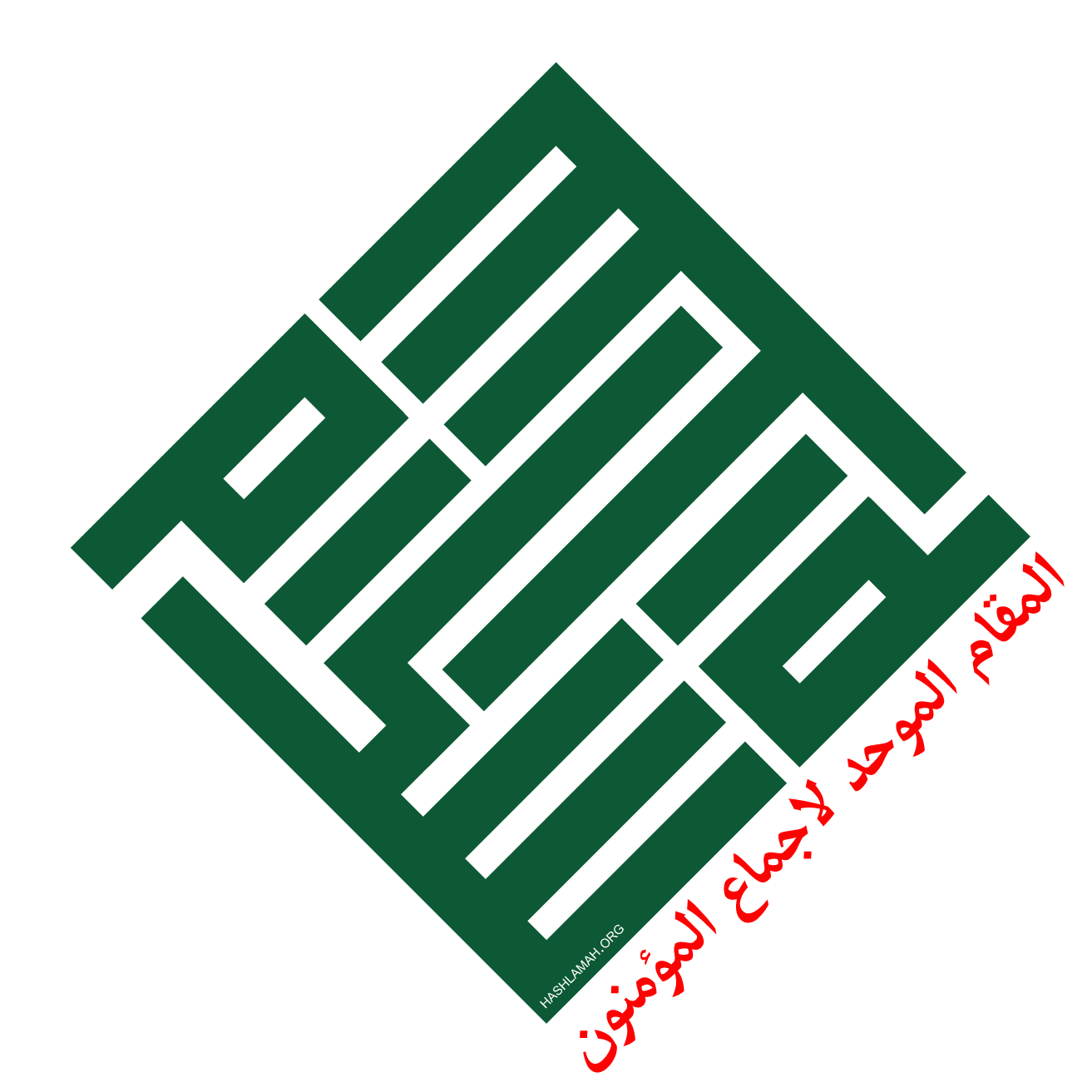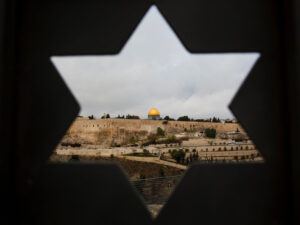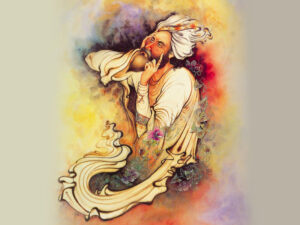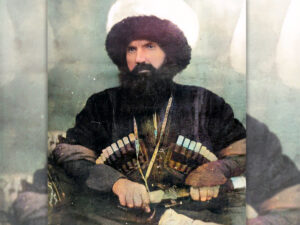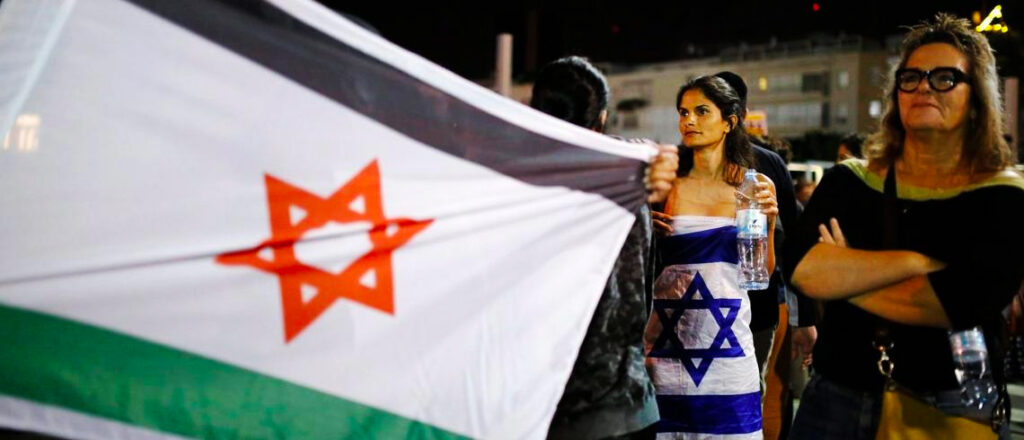
In his article on “The Refugee Question,” Ziad Abu Zayyad writes that “the Palestinian-Israeli conflict does not date from today or the 1967 war.” Instead, Ziad says, “it goes back to the 1930s and 1940s when the Zionist movement stepped up its efforts to bring Jewish immigrants to Palestine.” This, he concludes, was what set the stage for a future confrontation with the Palestinian Arabs.”
True, the Zionist movement had “stepped up its efforts to bring Jewish immigrants to Palestine” during the 30s and 40s. The critical thinker might ask, however, what else was going on in the world, in many most ways particular to the Jewish experience[1] during those years? The Palestinian leadership of the time, which had seized the reigns of Palestine through Arab on Jew and Arab on Arab terrorism and subsequent British appointment (following defeat at the ballot box), tragically allied itself with the very oppressive Nazi force that European Jewry was fleeing.
Zaid is wrong. The tap-root of the conflict extends much deeper than attributing provocation to the act of a people fleeing extermination. The roots go back to the violence that had been perpetrated against Jews who merely dared to live, to exist, as immigrants purchasing property from their Arab neighbors who were similarly targeted due to their willingness to coexist in peace. From the Jerusalem, ironically named Nabi Musa riots of 1920, to the massacres of Hebron and S’fed of 1929, both immigrant and indigenous Jewish communities were terrorized by the Neo-Salafi faction of Hajj Amin al-Husayni that would come to define the Palestinian struggle to the world and to the subsequent generations.
Injustices against the Palestinian people occurred – a “full expression” Zaid says, in the 1948 war – and Israel must confront that as much as the United States must confront its own legacy of exploitation and oppression. However, while many – even Palestinian Muslims – will see no moral qualms with living on the former sacred land of the indigenous North American population, simply being a Jewish Israeli citizen is seen as a crime which legitimizes you as a military target. This is not a mere statement of Jewish frustration, it is an articulation of a double standard. With this wide-spread perception in the Muslim world, both sides must ask: if I will not listen to you, then how can I expect you to listen to me?
The Right of Return
Zaid is correct in his assessment of the failure of Israel to abide by the internationally recognized right of a people to flee their homes in a time of war and return thereafter. Israel is correct to assign blame to Arab Nationalist provocateurs, and to the Mufti’s terrorism as giving birth to the Irgun, Stern-Lehi and further rogue elements of the Haganah.
What if, for all the wrongs of each side against the other, the right of refugee return will not happen? Clearly injustices occur in the East and West alike which are never restored to the state before the respective offenses. The South Western United States will never be restored as Northern Mexico. What if the Latino world as whole thus rejected peace with the United States, and targeted American civilians?[2] Ziad writes:
Giving up on the right of return came to be regarded as an act of treason, and many politicians refrain from saying aloud what they really think in private about the possibility of exercising this right or the practicality of insisting on it, while insisting on it, at least for some of them, as a bargaining chip at the negotiating table.[3]
Rashid Khalidi, in The Iron Cage: The Story of the Palestinian Struggle for Statehood, takes a much more thought out approach:
The Palestinian National Charter… represented both a step backward and…would serve them poorly in subsequent years, as its rhetoric could easily, and not unfairly, be cited as evidence that the Palestinians did not accept the existence of the state of Israel or the presence in Palestine of the Israeli people.[4]
Ziad writes, “there is not a single Palestinian who, deep down inside or purely out of choice, would give up the right of return.” But it was not their choice, and ultimately it is politically out of touch to imagine that it will be. Orit Gal writes, in Israeli Perspectives on the Palestinian Refugee Issue, that “the element of ‘the right of return’ is in essence a symbolic political issue rather than an operational one.”[5] Khalidi agrees, telling us of those who “unreflectively talked of ‘liberating’ Palestine,” meaning “restoring an Arab Palestine that had never been a sovereign state, and whose social basis was irrevocably gone.”[6] He notes that in “attempting to turn back the clock, Palestinians once again appear to have given little serious thought to the nature of the relationship between them and Israeli Jews who would remain in such a projected Palestinian Arab state. Similarly, he parallels this to the failure of the Palestinian leadership during the Mandate period, there was no appreciation of Zionism as anything more than a colonial movement… the founding of the Palestine Liberation Organization in 1964 consecrated this simplistic approach.”[7]
Orit Gal asserts, in Israeli Perspectives on the Palestinian Refugee Issue, that Israelis will never “accept full responsibility” for the refugee problem, any more than the Arab States can take all the blame. Polls suggest, however, that nearly half of Israelis accept the nation’s shared responsibility in creating the problem. Poignantly, Gal asserts that mutual understanding is a key factor in reconciliation.
Addressing the issue through a discussion of shared responsibility, not only with the Palestinians but also with the Arab countries which fought in the war, may help to further increase the political flexibility around the negotiating table. [8]
In Negotiating an Israeli-Palestinian Breakthrough, Alon Ben-Meir explains that “the answer has become gradually clear to a majority of Israelis and Palestinians who believe that neither side can improve their position through the continuation of the conflict and there is no place to go but coexistence.”[9] It is this blatant realism that the Muslim world must face. If it will not as a whole, then the Palestinian people must ignore the goading of an ummah which treats them as an ideological commodity. The Palestinian people must do what is in their best interests, not what sounds good on paper or the Internet. Thus, Ziad writes, that “giving up the absolute right of return is no more confined to the Palestinians who favor the political option, but includes as well the Arab states whose initiative has gained the support of the umbrella organization the Organization of the Islamic Conference.”
In 2002, Sa`udi Crown Prince Abdullāh declared his intention to lead the Arabs in acceptance of Israel in return for peace between the Israelis and Palestinians. For all the rhetoric, Sa`udi expelled its Palestinians with nary a cry from the Muslim world. The royal family has been talking about solutions since before there was an Israel, in the 1926.[10] Yet today people in Gaza live in abject poverty while the House of Sa`ud buy private mega-airliners as big as mansions and Dubai employs virtual slaves of African origin to built its playground of moving sky-scrapers and obscene artificial islands shaped as palm trees.
One State, Many Peoples
In the transcripts of Stephen P. Cohen’s “Is a two-state solution still viable?”[11] the moderator notes that in the 1990s, “it was clear that the trend on both sides was toward greater acceptance of coexistence in a two-state framework,” but during the Bush and Sharon years – paralleling the second intifāḍah – we saw “a hardening of attitudes and an apparent reduction of willingness on both sides to consider a peaceful coexistence with the other on terms that the other would find acceptable.”
The Two-State meeting posed the questions: “Are Israelis now prepared to accept a viable, a real Palestinian state on part of the territory of the old Palestine mandate… Are Palestinians prepared to accept the Israeli state as it has evolved over these past 55 years?” In other words, is the two-state solution is “an idea whose time has come” or is it “an idea whose time has passed.” Ben-Meir explains the Two-State position in the following illustration:
The expulsion of Palestinians, as some Israeli radicals have advocated, has been largely rejected on moral grounds and fear of international condemnation and potentially unimaginable consequences. Maintaining the occupation is clearly unsustainable because of the raging violence and the continuation of the state of war with the Arab world, and lastly, annexing the territories has presented Israel with two unacceptable choices: either deny the Palestinians equal political right and thereby render Israel an apartheid state, or grant them equal rights and thereby lose the Jewish national identity of the state almost overnight. In that sense, the second Intifadah provided the Israelis a rude awakening and made the remaining option of a two-state solution the only sane choice.[12]
Cohen notes a major factor in reconciliation is the heated rhetoric on both sides. While not restricted to one side, there is a more pervasive air of polemic throughout the Muslim world; one which over simplifies Jewry as a monolithic perspective.
American Jewry is a community, which has a wide range of political views and political understandings of what is the best policy for the United States and the Middle East and what is the best policy for Israel to survive as a prosperous, safe country in the future of the Middle East. The problem is that there is a big distance between that variety of views and the way that the community is represented in the political struggle and in the understanding of the political struggle in the media and political discussion.[13]
The issue of American Jewry, Cohen assesses, “is perhaps the most misunderstood issue in this conflict.” This is “because it is the kind of issue that is discussed sotto voce, not as part of serious political analysis but as part of mudslinging, as part of talking behind the back, as part of implicit hatred and resentment.”[14] The bulk of American Jews, Cohen rightly expresses, are strongly in favor of a Palestinian state. This dominant view of American Jewry goes unnoticed by the vast majority of Western politicians, media and certainly the Muslim world.
In the same transcript of the Two-State discussion, Michael Hudson takes a pessimistic look at the “the old bi-national model,” which “doesn’t say a lot about how you get to the final status issues, the famous issues of Jerusalem settlements, borders, refugees and so on.” He conccludes that the roadmap “may be leading in a very circuitous way to the goal that it seeks to reach.”
From the beginning, however, Khalidi cites that “leading Jewish thinkers” such as Martin Buber and Judah Magnes advocated a single, binational state “because they saw the inherent injustice, and ultimately tragic consequences for both people” otherwise.[15] Khalidi, nevertheless, sees a One-State solution as plagued with insurmountable obstacles, yet he references Meron Benvenisti, the former deputy-mayor of Jerusalem, who cites “a variety of analysts” who have argued that “the inexorable cementing of Israel’s hold over the occupied West Bank and East Jerusalem have rendered moot the possibility of establishing what could legitimately be called a Palestinian state.”[16]
The Strategic Depth of the vast and scattered settlements in the West Bank most obviously complicates the issue, as does the reality that Israel will never relinquish Jerusalem, a sticking point for Palestinians as well. Khalidi explains, clarifying the argument to the Arab world, that “those who foresee some kind of a one-state solution… render no value judgments about it… it purports rather to be an empirical reading of current trends.” Still, the One-State solution seems to him to be most at odds with the aspirations of the Palestinians. Paradoxically, Palestinian leadership has called for a Palestinian state and the return of refugees within the Israeli borders.
Can Two “Rights of Return” Occupy the Same Space?
Implicit in this is a denial of the right of Jewish immigrants to live within the region at all. We must remember that before any land was taken in the 1947-49 wars, or any Palestinian flight, over a third of the region’s population was Jewish. Those Jews and their progeny – who have in almost all instances intermarried with subsequent immigrant `olim, millions being from the Arab world – highlight the over-simplistic approach of the Muslim world as a whole, which speaks of Jews “going back” to their places of emigration.
Ziad elucidates that, in talking about the right of refugee return, we are in effect talking “about the type of solution we want for the Palestinian-Israeli conflict.” Whoever talks about this return “has to bear in mind that it is intertwined with the method by which this right is to be exercised.”Gal writes that, “many of the operational arrangements concerning the solution to the refugee issue relate to the establishment of permanent residency and citizenship.”[17]
Somewhat realistic, Ziad concedes awareness that “Israel rejects and will always reject the return to it of large numbers of Arabs as citizens with full citizenship rights.” Such a scenario “would tip the demographic balance and would cause it to lose its Jewish character and Jewish majority.” Therefore, in the face of this reality, “we should understand and acknowledge that talk about a political solution to the conflict is futile if, at the same time, we want to exercise the right of return in absolute terms, because this will spell the end of Israel as a Jewish state, a matter that Israel will not accept willingly.” Surveying Israeli perspectives, Gal asks “how should the Palestinian demand for Israel to take responsibility for the creation of the refugee problem be addressed?”
This demand places the Israeli leadership negotiating the agreement in a difficult predicament vis-à-vis the Israeli public, as this element touches on two traditional collective standpoints: (i) the rationale that as it was the Palestinians who started the war, Israel cannot be expected to take responsibility for its consequences; and (ii) a lack of conceptual and emotional distinction made between the events of the war itself and the creation of the state of Israel, i.e., the idea of taking some responsibility for the creation of the problem is immediately associated not with the events of the war, but with the very presence of a Jewish community in this area, a presence that has yet to be accepted by the Arabs. This view may be summed up as: “We cannot apologize for existing.” [18]
If the demographics are the root of Israel’s apprehensiveness, then Ziad asks “why not think of creative solutions that can address the demands and fears of both sides?” In this, we find the strength of his position. Ziad focuses on a distinction between “residency” and “citizenship” which he says could be differentiated in such a way as to guarantee “the stability, dignity and human security” of these returning “residents”. Refugees would have recognition of the “right to return to their homes and lands in Israel wherever possible, or relocated and rehabilitated nearby. With to this approach, returning refugees would not be given full Israeli citizenship but the right to the status of full residents — without their being vulnerable to expulsion as is the case at present with the Arabs of East Jerusalem.”
How this would effect subsequent generations, or if negotiations would include a distinction for current residents in the Palestinian territories to attain full voting rights would further align the proposition with democratic and moral standards. Further, a more balanced solution could be mustered with Parliamentary representation akin to the Christian control of Lebanon (which is regarded as no longer demographically favoring the Christian population). In such a way, the state could remain Jewish in the same way that Lebanon is Christian; even while affording wide Muslim participation and representation.
This breath of relatively fresh air, however, is stifled by bizarre outbursts that “Israel’s real intention is to grab as much Arab land as possible.” It is almost inconceivable that the author could legitimately believe that Israel wishes to possess the entire Middle East, or that since Oslo that even the most right-wing elements have not abandoned any notion of a “Greater Israel” or the “Nile to the Euphrates” exaggerated claims of Yasser Arafat, in taking the recreation of the Hasmonean coinage from 40 BCE as a true modern political aspiration.[19] Nathan Guttman notes, in Cohen’s Two-State panel, that “Israel has abandoned the notion that was for some a dream of greater Israel. The process of realizing the fact that the Israeli border on the East will not be the Jordan River and that there is a Palestinian entity that has to be taken into consideration has grown in the Israeli public for the past two decades, but it was the Oslo Accord, signed in 1993, which turned this mental realization into a political fact” – one accepted even by Netanyahu and Sharon. [20]
In his article, “Two State Plus: Jerusalem and the Binationalism Debate,” Michael Dumper exposes the “false dichotomy” which pits the binational against the two-state models. The dichotomy is based on the view that the two models are wholly separate and clearly defined types when in fact a closer examination of their features reveals many areas of overlap.”
Socio-Religious Amnesia and the Art of Listening To Each Other
Many familiar with the debates associated with the Israel-Palestine debates are aware of such figures as Norman Finkelstein, an avowed advocate for Palestine. We also find Ian Lustick to be critical of the Israeli government in many instances, though without a doubt capable of avoiding some of the controversies that have plagued Finkelstein. A brilliant scholar of Political Science, Lustick is less impressive when it comes to various facets of the history at the deep roots of the conflict. Though identifying himself as a Jew, he seems oblivious to the place of Jerusalem in the collective historical memory of his own Jewish heritage.
He speaks of the “commitment of both Labor and Likud” to construct “an image of expanded Jerusalem as an integral and permanent part of the country.”[21] He grafts ideas of sexual fetishism onto Israeli fixation on Jerusalem, asserting somewhat awkwardly that “a political fetish is successful when it is transformed, first into a majority opinion, then into a consensual doctrine.”[22]
Noting the absence of the Temple Mount, the “Wailing Wall” or Kotel, and Jewish Quarter (as well as the Old City), in Ben-Gurion’s 1949 comments on Jerusalem as the “eternal capital” of Israel, Lustick ignores the fact that Ben-Gurion was accepting a – then current – political reality. He was not, nor would anyone, including Lustick we can be certain, suggesting that the Temple Mount, and the Kotel were not considered part of Jerusalem in the minds of Jews the world around, long before then and ever since. If any site could be agreed upon as being understood by Jews as within Jerusalem, this would be it.
Almost painful for the historian to read, Lustick seems plagued with an amnesia which –in the words of the Biblical Psalmist – is like forgetting one’s own right hand.[23] The Jewish attachment to Jerusalem, historically spanning millennia, is that sincere and that deeply rooted. One wonders if Lustick has never heard the closing invocation of any traditional Passover Seder: L’Shanah Haba’ah BiYerushalayim (“Next Year in Jerusalem”)!
To imagine for a moment that the lack of compromise which are the trademarks of Israeli right-wing politics, emerged as a “fetish” to “be made” into something newly sacred, or even to be unaware that the roots of the conflict between Jews and Palestinians ultimately trace to the repression, by the Husayni faction, of Jewish rights to worship unrestricted at the Kotel, belie a surprising unawareness of important and relevant facts. Herein lies the key for Jews and Israel’s advocates throughout the world, to bear in mind. If someone like Lustick can overlook what should be more than obvious to him, then how much easier is it for the Muslim world – which knows very little accurate information about Judaism, Jewish culture and the centrality of Jerusalem in the religion, to do the same?
Israel must understand that the Muslim world knows very little about them, and nearly all that they think they know about Jews and Judaism in general is patently false. They must realize that a rouge faction emerging from a marriage between Salafism and Sa`udi Wahhābism, was responsible for stripping the democratically elected leadership of the Palestinians, and for polarizing Jews and Muslims (and often, Arab Christians) against one another. Just as the Muslim world knows very little about these relevant issues in Judaism, it similarly is kept in the dark about the political roots of the conflict. The Muslim world is sold a polarized vision of the conflict – indeed just so much of repressive religious minority in Israel is. The average Israeli Jew could not tell you about the Nashashibi-Husayni rivalry, nor of the kidnappings, tortures and murders at the hands of this Palestinian British appointee… but then again, neither could the younger generation of Palestinians. If we don’t know history, it is said, we are doomed to repeat its mistakes. But we are also, through our lack of knowledge, susceptible to rhetoric and propaganda from each respective side.
A Two-State or One-State solution will do little to promote true and lasting peace unless it is part of a systematic effort to critically examine the national myths on both the Israeli and Palestinian sides, as in the “New Historiography” of Israeli scholarship. It must strip away rhetoric and replace it with citation and authenticate of all claims. This may seem impossible, just as a generation ago it would have seemed impossible for Sa`udi `Arabia to have underground metal bands, playing in secret, women beating up religious police who come to harass them. Even in 2004, what American would believe that the winner of the next election would be an African American, with an `Arabic name, born of a foreign Muslim? Little by little, the critical thinking and thirst for freedom from man-made methods of state religious and social control is seeping in. From the iron fist of Wahhābism in Sa`udi, to constant encroachment of the often antiquated views of the Israeli Rabbinate in national politics the majority are gravitating towards the center.
Works Cited
Barnett, Michael. Israel in Comparative Perspective. SUNY Press, 1996.
Ben-Meir, Alon. “Negotiating an Israeli-Palestinian Breakthrough.” MEP XVI, no. 1 (2009): 53-62.
Cohen, Stephen. “Is a two-state solution still viable?” (accessed 2003).
Dumper, Michael. ““Two State Plus: Jerusalem.” Jerusalem Quarterly 39, no. 7: 6-15.
Gal, Orit. “Israeli Perspectives on the Palestinian Refugee Issue.” Palestine-Israel Journal. http://www.pij.org/details.php?id=1216 (accessed May 07, 2010).
Jbara, Taysir. Palestinian Leader Hajj Amin Al-Husayni. Princeton: Kingston Press, 1985.
Khalidi, Rashid. The Iron Cage: The Story of the Palestinian Struggle for Statehood. Boston: Beacon Press, 2007.
Sussman, Gary. “The Challenge to the Two-State Solution.” merip.org. June 2004. http://www.merip.org/mer/mer231/sussman.html (accessed May 07, 2010).
Zayyad, Ziad Abu. “Between the Political Solution and Exercising the Right of Return.” Palestine-Israel Journal. http://www.pij.org/details.php?id=1215 (accessed May 02, 2010).
Endnotes:
[1] Though perhaps a controversial statement, the exploitation of other groups notwithstanding, Africans were exploited and oppressed throughout centuries of the brutal Trans-Atlantic Slave trade (and for a century after their emancipation in the US, they continued to be enslaved in the Sa`udi `Arabia). Native Americans were slaughtered in massive numbers, but never targeted for a systematic rounding up and extermination. The United States sought in many cases to indoctrinate Natives, accustom them to Western dress and convert them to Christianity. They were not, as Africans were not, targeted for extermination based on even one grandparent having the targeted heritages. It is for this reason that I maintain the position that the Shoah was unique in its systematic attempt to exterminate a people as Hitler defined.
[2] Palestinians were – to be sure – deprived of their rights to return after fleeing their homes in a time of war. African Americans were deprived of their rights too, on a much greater scale. None has ever received their 40 acres and a mule. There are still no reparations and there likely never will be. What then if the Southern Africans rejected the Emancipation Proclamation and demanded full control of the United States which they economically built? The proposition sounds ridiculous. Oppressed Africans were thrilled with such a significant improvement in American society. It hardly meant that the political battle was over – really it was only beginning – but it could not have begun there if there was not a willingness to accept that things would never be the same; the status before the Trans-Atlantic Slave Trade could never be restored.
[3] Zayyad, Ziad Abu. “Between the Political Solution and Exercising the Right of Return.” Palestine-Israel Journal. http://www.pij.org/details.php?id=1215 (accessed May 02, 2010).
[4] Rashid Khalidi. The Iron Cage: The Story of the Palestinian Struggle for Statehood. (Boston: Beacon Press, 2007), 190
[5] Orit Gal. “Israeli Perspectives on the Palestinian Refugee Issue.” Palestine-Israel Journal. http://www.pij.org/details.php?id=1216 (accessed May 07, 2010).
[6] Khalidi, 189
[7] Ibid
[8] Orit Gal, Israeli Perspectives on the Palestinian Refugee Issue
[9] Alon Ben-Meir. “Negotiating an Israeli-Palestinian Breakthrough.” MEP XVI, no. 1 (2009): 53-62. 4
[10] That “solution” being the revival of the Caliphate. Taysir Jbara. Palestinian Leader Hajj Amin Al-Husayni. (Princeton: Kingston Press, 1985) 103
[11] A dialogue between himself, Michael Hudson, Nathan Guttman, and Khalil Jahshan. Stephen Cohen. “Is a two-state solution still viable?” (accessed 2003)
[12] Alon Ben-Meir explains, in Negotiating an Israeli-Palestinian Breakthrough 4
[13] Stephen P. Cohen’s “Is a two-state solution still viable?”
[14] Ibid.
[15] Khalidi, 187
[16] Ibid, 207
[17] Orit Gal, Israeli Perspectives on the Palestinian Refugee Issue
[18] Ibid.
[19] Or beyond that, the most unrepresentative fringe musings.
[20] Stephen P. Cohen’s “Is a two-state solution still viable?”
[21] Michael Barnett, ed. Israel in Comparative Perspective. (1996, SUNY Press) 149
[22] Barnett, 143. Quoting Achille Mbembe that a fetish “aspires to be made sacred.”
[23] Psalm 137:5
